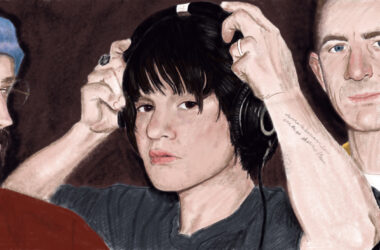Japanese Breakfast–Brooklyn-based singer and guitarist Michelle Zauner’s solo project–released their sophomore album Soft Sounds From Another Planet (Soft Sounds) on July 14.
Zauner was once the frontman of the emo indie band Little Big League, where her yelping vocals and decisive lyrics earned the Philadelphia band the designation of “underrated.” Zauner became a natural standout in indie rock; her confidence, emotive voice, and confessional writing began drawing a solid fanbase and critical attention.
In 2014, when Zauner’s mother was diagnosed with cancer, she moved back to her hometown of Eugene, Oregon. It was during this period that Japanese Breakfast emerged. In the months after Zauner’s mother died, Psychopomp, Japanese Breakfast’s first album, began recording.
Psychopomp, released in 2016, cuts deeper than Zauner’s Little Big League material. The album’s sound ranges from dream pop to pop punk, but its lyrical themes are what leave an impression; the shock, anger, and daze of loss are palpable throughout the record.
The death of Zauner’s mother became the story of Psychopomp, and preceded any conversation around Japanese Breakfast. Delivering the album as such a distinctive emotional entity made every line more urgent and meaningful. As a project that materialized from such a powerful event, to which listeners connected with so deeply, Zauner had set a high bar for herself.
Initially, Zauner felt unable to match the emotional weight of Psychopomp on her second album.
“I felt like [Psychopomp was] my death record, that’s my grieving record, I can’t write that again,” Zauner told The McGill Tribune. “I wanted to make something like science fiction, like a very heavy handed scifi concept musical.”
Zauner intended to go this direction largely because of the emotional labour that putting out such a personal record as Psychopomp required.
“I was really exhausted of talking about my mother’s death to strangers everyday, and to interviews all the time, or to kids who would just come up after shows and share that they lost their parent,” Zauner explained.
Although a space rock musical was her plan for the form of Soft Sounds, after writing “Machinist” she found she couldn’t keep up the charade.
“It just felt so phony and I just couldn’t dial it in for another 10 tracks,” Zauner said. “So I just thought to myself ‘I can never get over my mother’s death, it will always be a part of my narrative.’ I can’t just not write about that experience anymore.”
With this second start, Zauner and co-producer Craig Hendrix recorded Soft Sounds in just one month, October 2016. The pair played all instruments on the tracks, a recording setup Zauner called more “intimate and private”. Both sonically and lyrically, Soft Sounds reflects a maturity–Zauner explained how being two-years removed from her mother’s death helped her compose the lyrics to her songs.
“I think a lot of [Soft Sounds] is about giving myself advice,” Zauner said. “Trying to think of death and trauma as kind of outside of yourself, a little more objectively. Like, that happened and it’s not like the universe is out to get you, it’s just part of life.”
In terms of Soft Sounds’ actual sound, Zauner explains that, while she always aims for the pop song format when composing, genre isn’t something she to which she adheres.
“More than anything I try to make every song have its own world,” Zauner said.
This effect is noticeable on the album. Opener “Diving Woman” is a synth-heavy shoegaze track, while songs like “Road Head,” “Til Death,” and “This House” jump from trip hop, to Roy Orbison-inspired 50s pop, to a stripped-down acoustic ballad. Whatever the world each song inhabits, the production is meticulous in its respect of each genre. In this regard, Zauner simply believes she allowed herself to follow what excited her.
“I just really had the courage to follow whatever creative path was interesting.” Zauner said. “[…] I just kind of chased whatever was interesting to me.”
The whims of this chase are apparent on the album, but not in a way that sounds jarring or hobbled together. Each song-world feels equally sincere and full of energy.
Letting herself to chase these whims is what, at the end of the day, allows Japanese Breakfast to continue flourishing as a project beyond Zauner’s initial period of grief.
“I think the more I bar myself from writing something the more stuck I’ll be, in general,” Zauner said, when explaining the importance of Japanese Breakfast as a personal project. “I spent four years trying to be tough in Little Big League. Once I started just making music that interested me [that’s what] helped people connect with my work.”







